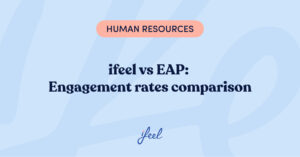Organisational leadership combines specific skills and qualities applied to the work environment and work teams. As you may already know, a managerial approach positively influences a team’s performance in an organisation with a specific strategy and objectives.
When establishing a strategy, it is vital to consider the company’s and the individual’s mission and vision to develop and achieve the goals set. Different leaders have different leadership styles. However, the end goal should not only focus on overall company success, which is undoubtedly essential but also on employees’ mental health and emotional well-being.
So, how can you balance achieving organisational goals while fostering a work culture that prioritises your team’s well-being?

Why is organisational leadership important?
Organisational leadership is a crucial factor in developing healthy companies with healthy employees. Compared to traditional management styles, organisational leadership is people-oriented to achieve maximum productivity and mental well-being. Organisational leadership is pivotal for modern companies because:
- It helps processes run smoothly. As an effective leader, the person in charge should know their employees’ strengths and weaknesses. By analysing this information beforehand, they know what should be assigned to each individual. This will help the process be as efficient as posbbile and enhance employees’ strong points and skills.
- Strong organisational leadership skills are also a great way to motivate employees. They don’t need a boss but approachable leaders who healthily stimulate their team members. This will increase their commitment to the organisation, improve talent retention, and reduce employee turnover rates.
- Fosters performance and success. As mentioned earlier, top leaders boost employee morale and motivation. They foster a positive work environment where they encourage employees to do better and perform at their optimum level. Research shows that companies with strong leadership development programs experience 37% higher revenue per employee and are 9% more likely to outperform their competitors in the market.
Top skills and qualities every leader must master
So, how do we differentiate organisational leadership from conventional leadership? Leaders have many skills and qualities to successfully perform two main tasks: leading teams and focusing on their individual needs. If you’re interested in improving this methodology, keep reading and consider the following aspects when examining organisational leadership:
| Key skill | Description | Impact of poor implementation |
|---|---|---|
| Effective communicator | Organisational leadership requires smooth communication from all parties. Clear and concise communication helps create a shared vision, fostering team cohesion and trust. | Poor communication can disrupt a team’s strategy, leading to misunderstandings and slowdowns, which hinder performance. Misinterpretations increase, leading to a lack of clarity and decreased efficiency. |
| Problem-solver | Leaders must solve problems with a solutions-focused approach, keeping the team’s well-being in mind. They should handle conflicts by fostering a positive work environment and making strategic decisions. | Failure to address conflicts and issues creates a toxic environment, decreasing morale, collaboration, and overall productivity. Lack of a structured problem-solving approach can leave conflicts unresolved. |
| Goal-oriented | Goal orientation helps leaders develop people-centric strategies and continuously analyse performance for practical results. | Without clear goals, employees might frequently seek guidance, wasting time and resources. Unstructured goal setting can lead to misaligned efforts and a lack of accountability. |
| Prioritise employee well-being | Prioritising employee well-being is central to organisational leadership. Balancing personal and professional lives is challenging, especially for those with mental health issues. | Neglecting employee well-being leads to burnout, higher absenteeism, and low engagement. Over time, this creates a toxic work culture and negatively affects overall productivity. |
Quick leadership self-assessment
Rate yourself on a scale of 1 to 5 (1 = Strongly Disagree, 5 = Strongly Agree) for each of the following statements:
| Statement | Rating (1-5) |
|---|---|
| 1. I regularly ask for feedback and create an open space for team members to share ideas. | |
| 2. I regularly ask for feedback and create an open space for team members to share their ideas. | |
| 3. When faced with a problem, I take a solutions-focused approach and consider my team’s well-being in my decisions. | |
| 4. I set clear and achievable goals for my team, and we regularly track our progress. | |
| 5. I encourage autonomy in my team by providing clear expectations and allowing them to manage their tasks. | |
| 6. I actively work to foster a positive work environment and address conflicts promptly. | |
| 7. I prioritise my team’s mental health and well-being, and I ensure they have access to necessary resources. |
Scoring:
- 28-35 points: You’re demonstrating strong leadership! Keep fostering communication, solving problems effectively, and prioritising well-being.
- 18-27 points: You’re doing well but may have a few areas to work on. Focus on improving communication, goal-setting, or team autonomy.
- Below 18 points: There’s room for improvement. Consider focusing on specific areas like problem-solving or creating a more open, supportive work environment.
How ifeel’s resources can empower your organisational leadership
Organisational leadership requires not only strong communication and problem-solving skills but also a deep understanding of employee well-being and strengths-based management. To enhance your leadership approach, we recommend two essential resources to provide you with the insights and strategies you need to foster a thriving, resilient team.
1. Mental Health Report 2024: Prioritising well-being for long-term success
In today’s workplace, mental health is no longer an option. It’s a priority. The Mental Health Report 2024 offers comprehensive insights into the latest trends and data on workplace mental health. This report will help you understand how mental well-being impacts employee productivity, retention, and overall performance. By integrating these findings into your leadership strategies, you’ll create a healthier, more engaged workforce.
Ready to lead a healthier workplace? Get your hands on the Mental Health Report 2024 now and start shaping a mentally resilient team today.
2. Strengths-Based Leadership Strategy: Empower your team’s full potential
Every great leader knows that success comes from maximising the strengths of their team. The Strengths-Based Leadership Strategy resource offers actionable insights on identifying and leveraging your employees’ unique strengths. You can improve team collaboration, innovation, and overall productivity by focusing on strengths rather than weaknesses.
Want to unleash your team’s full potential? Access the Strengths-Based Leadership Strategy and start driving extraordinary performance today.

Trust the leaders in mental well-being
We hope this post about organisational leadership has provided you with interesting ideas that you can start applying straight away with your team.
To support companies in this process, our team of expert psychologists has crafted a comprehensive mental well-being solution designed specifically for large organisations. Our solution empowers HR leaders like you with personalised, data-driven insights to identify mental health challenges and improve workplace culture.
What I value most is the direct and close approach of ifeel professionals. It seems that they have also become part of the team and someone who is already embedded in our company dynamics, therefore someone who can be trusted to support us.
– Vasco Armés, Head of HR at PERI Iberia, an ifeel partner company.
By partnering with ifeel, you’ll receive actionable strategies to address employee well-being, reduce burnout, and increase engagement while creating a thriving and positive organisational culture. Our tailored mental health services offer structured support to employees, ensuring they have access to the care they need when they need it.
Ready to transform your workplace? Request more information and discover how ifeel’s corporate mental well-being solution can help your team excel while enhancing employee satisfaction and productivity. Let’s work together to unlock your team’s potential.







